Read Reviews
The Best Petrol Pressure Washers
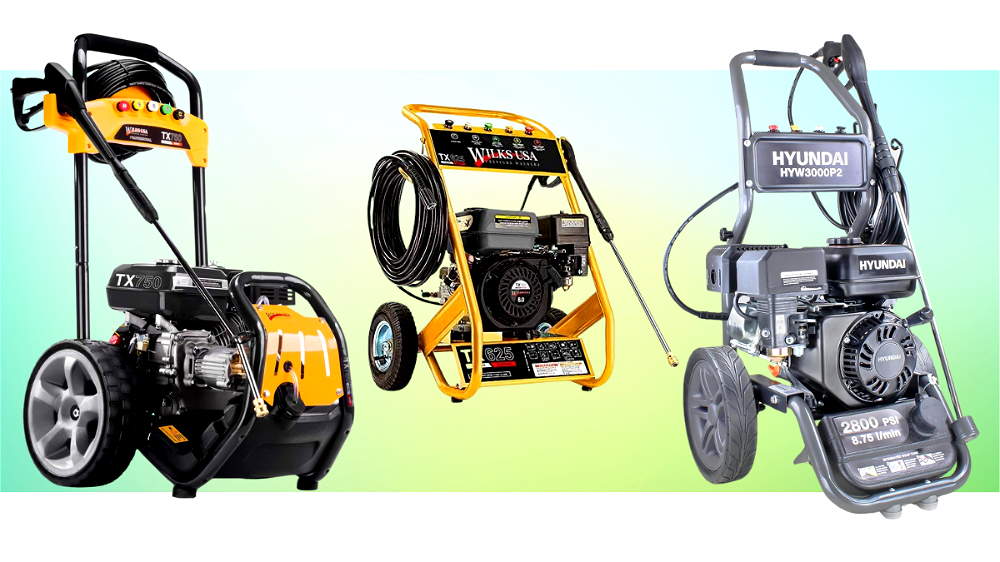
-
Best petrol pressure washer overall - Wilks-USA TX750i Petrol Power Pressure Washer
-
Best for static water source - Wilks-USA TX625i Petrol Power Pressure Washer
-
Best versatile pressure washer - Wilks-USA TX750 Petrol Power Pressure Washer
-
Best fuel consumption - Hyundai HYW3000P2 Petrol Pressure Washer
-
Best reliable washer - Waspper W3100HA Petrol Pressure Washer
-
Best high-power washer - Hyundai HYW4000P Petrol Pressure Washer
-
Best commercial washer - Hyundai HYW3100P2 Petrol Pressure Washer
-
Best budget option - RocwooD RWHPPW Petrol Pressure Washer
-
Best value washer - RocwooD RS780 Petrol Pressure Washer
-
Best lightweight washer - SwitZer Euro V Petrol Pressure Washer
Petrol Pressure Washer Reviews
1. Wilks-USA TX750i Petrol Power Pressure Washer
Best petrol pressure washer overall
- Very easy to use and transport
- 30 m of hose in total - ample reach for any task
- 6 ‘click and go’ nozzles for blasting, stripping, cleaning, washing and detergent application
- Built in 6L detergent tank for stubborn jobs
- Poor and unclear assembly instructions
- Changing the hose or lance is tricky and requires the use of a spanner
- Uses a lot of fuel - not economical to run
- The nozzles fall out of the rack frequently, so it's not practical to store them there
- Engine
- 210cc
- Max Pressure
- 272 bar
- Flow Rate
- 11L/min
- Hose Length
- 30m
- Weight
- 40kg
- No. of Nozzles
- 6
- Design
- 4.5
- Power
- 4.5
- Comfort
- 4.5
- Ease of Use
- 4.5
- Value for Money
- 4.5
Whilst some pressure washers can hold you back, keeping you tethered to the wall by not offering a decent amount of hose, Wilks-USA TX750i Petrol Power Pressure Washer comes with a 30 m hose that makes it possible to use it almost anywhere in the back or front garden.
Also, if you’re naturally concerned about how to deal with such a long hose when it’s not in use, there is a lot of well-thought-out onboard storage for both the standard 20 m hose, and the 10 m extension. If you’re working down the end of the garden, there’s enough length for that, but if you’re closer to home then you don’t need to worry about tripping over unruly coils of hose.
A hose with a filter system is included as well, which can be used to draw water from a bucket. So, in the unlikely event of working somewhere that simply doesn’t have access to a tap within 30 m, you can still make use of this powerful petrol pressure washer.
In terms of pressure, it works at 220 bar pressure, with a 272 bar max pressure (when it first starts spraying). Considering this combination of power, construction, and price, whilst it may not be the cheapest model available, it still offers good value for everything that’s included.
There can be a few teething problems when it comes to getting used to this machine’s specific personality: it vibrates quite a lot when used on low revs, and requires a spanner to change over the lances and hose. Like other models, it comes with various nozzles for creating different sprays (five, to be precise), but, whilst these are stored on the unit, they can jump out as a result of the vibrations.
There are, however, also a lot of practical features which make this pressure washer easy to use, such as the long cable length and ability to draw from any water source, so it’s really a case of weighing up the pros and cons depending on what jobs you’re hoping to get done.
Did you find this review helpful?
2. Wilks-USA TX625i Petrol Power Pressure Washer
Best for static water source
- Comes with 12 m hose plus extra 8 m hose so you can use it around your property without having to constantly move it
- Impressive 3950 PSI at 272 bar output
- Comes with a huge range of useful attachments
- The pressure is more than enough for most outdoor cleaning jobs
- Build quality isn't as solid as others on the market
- Getting the petrol cap off to refuel is a little tricky
- Uses soap very quickly so a 50/50 mix is recommended for easier jobs
- The instruction manual needs to be downloaded from the internet
- Engine
- 210cc
- Max Pressure
- 272 bar
- Flow Rate
- 12L/min
- Hose Length
- 20m
- Weight
- 32kg
- No. of Nozzles
- 6
- Design
- 4.5
- Power
- 5
- Comfort
- 4
- Ease of Use
- 4.5
- Value for Money
- 4.5
The Wilks-USA TX625i Petrol Power Pressure Washer achieves the sort of results that we all expect to see when using a power washer: we’re talking write-in-the-grime levels of cleaning power.
It’s cheaper than some petrol models, but still has a maximum pressure output of 272 bars which is powerful enough to tackle commercial cleaning, driveways and grimy patio slabs.
The pressure doesn’t stay up at 272 bars continuously, after an initial spurt, but it doesn’t drop down too dramatically either.
Running with a 4-stroke 210 cc engine, it uses unleaded petrol and has a separate oil tank which needs to be kept topped up. The recoil pull start is relatively easy to use, generally starting the engine after a couple of pulls.
Where this petrol pressure washer really comes into its own is in the number of functional accessories provided. A straight and curved lance come included, meaning you can unclog gutters without having to use a ladder and clean under car wheel arches too.
There are also five different pressure nozzles to change between, which all work effectively for different purposes – blasting, stripping, cleaning, washing, and detergent application.
As you can see, Wilks have clearly decided not to leave anything to chance, providing a nozzle for almost any purpose.
A particularly interesting attachment, which doesn’t often come included with pressure washers, is the ‘self-propelled drain cleaner’. It connects to the pressure washer’s nozzle with a hose, and has a rounded metal spray head. If you put it into a blocked drain, it will propel itself through the blockage, using the power of the washer to clear the channel.
This washer also offers flexibility in terms of where you can pull the water from – if you’re near a tap, you can simply hook the 12 m hose up to the faucet, but you can also draw water from static water sources like buckets, water butts and ponds.
What this really means is, this is one of the best petrol pressure washers to use just about anywhere, as you aren’t limited by tap proximity.
An additional 8 m hose is also included, which can be connected to the standard 12 m hose, to create a maximum reach of 20 m – more than enough to complete most jobs around the home.
Did you find this review helpful?
3. Wilks-USA TX750 Petrol Power Pressure Washer
Best versatile pressure washer
- High peak pressure of 272 bar and working pressure of 220 bar
- Can draw water from standing water sources as well as taps
- Pressure is enough for most outdoor cleaning jobs
- Very easy to put together - ready to go in less than 30 minutes
- Starts easily with just one or two pulls most of the time
- It is pretty noisy so you wouldn’t want to use it first thing in the morning
- Not very fuel efficient - a full tank of fuel gives around 2 hours of run time
- Can be a little difficult to fill oil tank because of location of filler cap
- Engine
- 210cc
- Max Pressure
- 272 bar
- Flow Rate
- 11L/min
- Hose Length
- 10m
- Weight
- 29.5kg
- No. of Nozzles
- 5
- Design
- 4
- Power
- 5
- Comfort
- 4
- Ease of Use
- 4.5
- Value for Money
- 4.5
The Wilks-USA TX750 Petrol Power Pressure Washer is an extremely versatile machine. It comes with a range of nozzles, plenty of power, and a 10m hose. Plus, it’s more compact than the other Wilks-USA machines featured on this list.
This petrol pressure washer is one of the more powerful models I’ve recommended. It offers a maximum water pressure of 272 bar, powered by a reliable 8HP 210 4-stroke engine. The general working pressure is 220 bar, with a 660 L per hour flow rate.
As mentioned, the range of included nozzles really add to the versatility of this pressure washer. It comes with 5 ‘click and go’ nozzles, each colour-coded with a specialised function. The red nozzle is for blasting, yellow for stripping, green for cleaning, white for washing and black for detergent. And on that note, there’s also a 6 L built-in detergent tank.
More compact than the other Wilks-USA models on this list, this pressure washer has a 10 m hose and it weighs 29.5 kg.
Also, if you’re worried about proximity to a water source – don’t be! This pressure washer can be used almost anywhere, as it can draw from standing water as well as a hose. It can be hooked up to a tap, bucket or even a pond.
In order to give a balanced review, it would be remiss not to mention a few of this pressure washer’s downsides – although there aren’t many. Firstly, it’s pretty loud – definitely not the sort of tool you want to be using first thing in the morning. Secondly, it’s not particularly fuel efficient. A full tank of petrol gives around 2 hours of runtime.
Overall, this pressure washer is one of the best on the market when it comes to versatility. The range of nozzles makes it suitable for various tasks and it has all the power you need for domestic use.
Did you find this review helpful?
4. Hyundai HYW3000P2 Petrol Pressure Washer
Best fuel consumption
- Fuel efficient: takes 2.5 hours to use a full tank of petrol
- Hyundai engine is reliable and powerful
- Much cheaper than other models on the market which offer a similar amount of power
- Lighter than many other models on the market - relatively easy to move in and out of storage
- Vibrates a lot which can lead to some of the bolts coming loose
- Detergent hose is prone to kinking
- Engine
- 212cc
- Max Pressure
- 213 bar
- Flow Rate
- 8.75L/min
- Hose Length
- 7.5m
- Weight
- 32kg
- No. of Nozzles
- 4
- Design
- 4.5
- Power
- 4.5
- Comfort
- 4
- Ease of Use
- 4.5
- Value for Money
- 4.5
If you’re looking for a powerful petrol pressure washer that doesn’t guzzle fuel, the Hyundai HYW3000P2 Petrol Pressure Washer is worth considering. With a 212 cc engine, it takes approximately 2.5 hours to use all the fuel in the tank.
And yet, this doesn’t indicate a lack of power. The Hyundai engine allows the pressure washer to operate at 2800 PSI, with a 213 bar output. It provides ample power for tricky cleaning tasks, capable of cleaning even tough black spot mould from patios. The hose is 7.5 m, so you’ll have some reach but not so much hose that you’ll constantly be tripping over it.
There’s a built-in detergent tank for tougher cleaning tasks, 4 quick connect nozzles, 0°, 15°, 40° and a low-pressure detergent spray nozzle. The variety of nozzles included make it possible to tackle a range of jobs, from blasting grime from your decking to cleaning your garden furniture.
Like many petrol pressure washers, this model can be connected to your mains water supply or draw water from a standing water source.
It has tough pneumatic tyres, a soft-grip handle, built-in nozzle holder and it doesn’t take too much effort to start. Plus, at 32 kg, it’s a relatively lightweight model (as petrol pressure washers go).
Overall, this is the best petrol pressure washer if you’re after something that’s powerful but also fuel efficient.
The only real downside to this machine is how much it vibrates. It’s equipped with anti-vibration feet but it still shakes considerably. This can result in some of the nuts coming loose. Therefore, it’s advisable to check them frequently whilst using the washer.
Did you find this review helpful?
5. Waspper W3100HA Petrol Pressure Washer
Best reliable washer
- Has enough power to get thick mud off patios and pathways
- Reliably, good quality Honda engine
- Easy to start, often on the first pull
- Very simple to assemble - just one screwdriver required for one screw
- Easy to manoeuvre thanks to the relatively light weight
- 7.5 m hose may not be long enough for some jobs
- Not as powerful as others on the market
- Engine
- 196cc
- Max Pressure
- 214 bar
- Flow Rate
- 8.5L/min
- Hose Length
- 7.5m
- Weight
- 28kg
- No. of Nozzles
- 4
- Design
- 4.5
- Power
- 4
- Comfort
- 4.5
- Ease of Use
- 4.5
- Value for Money
- 4
There’s a Honda engine fitted inside this pressure washer, and when a reliable brand like Honda starts getting involved, you know you’re in for something good.
The Waspper W3100HA Petrol Pressure Washer is powered by a 196 cc Honda engine which is reassuring in terms of quality, and impressive in terms of power. It’s the sort of machine that lifts stains out of concrete paving, instead of just removing the top layer of dirt.
It has a 7.5 m hose as well as an additional 40 cm stainless steel extension lance which allows you to clean in tighter spots without getting soaked. Though the 7.5 m hose may be a little short for some jobs, the pressure washer can be moved with you as you work.
With a maximum pressure of 214 bar, you’ll have the power required for deep cleaning jobs as well as lighter duty tasks.
There are three nozzles included. The narrow 15° nozzle is suitable for precise cleaning, while the 40° nozzle creates a wider spray that’s better for general cleaning jobs. All the nozzles can be stored on the unit and quickly switched in and out when needed.
While not quite as powerful as some others on the market, this washer still has enough gusto for domestic tasks. With Honda backing it, it’s the best petrol pressure washer if you’re after reliability.
Did you find this review helpful?
6. Hyundai HYW4000P Petrol Pressure Washer[ SAVE 7% ]
Best high-power washer
- Ideal for heavy-duty cleaning: easily lifts years of grime
- Durable and powerful enough for professional use
- Saves you a huge amount of time on tough cleaning jobs thanks to the high power
- Can draw water from static sources as well as taps
- 15 m hose length means you can stand a good distance away from the loud machine while it’s running
- Uses fuel quickly: approximately 3 L petrol/hour
- Loud in operation
- Engine
- 420cc
- Max Pressure
- 275 bar
- Flow Rate
- 15L/min
- Hose Length
- 15m
- Weight
- 61kg
- No. of Nozzles
- 4
- Design
- 4.5
- Power
- 5
- Comfort
- 4
- Ease of Use
- 4
- Value for Money
- 4.5
If sheer power is what you’re after, the Hyundai HYW4000P Petrol Pressure Washer serves up some real force. Boasting a 420 cc engine and operating with a maximum peak output of 275 bar output, this is a commercial-level pressure washer that will easily shift years of grime from surfaces.
Despite the power, it’s still relatively manoeuvrable, with large puncture-proof foam filled tyres (although that’s not to say it’s lightweight however, as it weighs a fairly substantial 61 kg).
Fortunately, it’s fitted with a 15 m hose, making it possible to complete many cleaning jobs without having to move the washer itself. It comes with 4 quick release nozzles as well as a turbo nozzle (just make sure you hold on tight when using this one!). In terms of performance, this is the type of pressure washer that can easily have old patios looking new again in record time.
This powerful petrol pressure washer also offers the convenience of being able to draw water from a static water source as well as a tap.
As you might expect for such a powerful washer, it’s pretty loud. It can also vibrate a lot in use so you should take regular breaks.
Overall, it’s the best petrol pressure washer if you want a high-power, professional-grade unit. It will tackle those seemingly impossible cleaning tasks and the sheer power of this professional-grade model means it’s worth splashing out on.
Did you find this review helpful?
7. Hyundai HYW3100P2 Petrol Pressure Washer[ SAVE 4% ]
Best commercial washer
- Sufficiently power to be used in a commercial settings
- Included turbo nozzle dramatically increases cleaning speed
- Large wheels help with manoeuvrability
- Hose isn’t as long as others on the market at just 7.5 m
- Needs to be used with a hose - no capacity to use standing water such as from a bucket or barrel
- Engine
- 212cc
- Max Pressure
- 213 bar
- Flow Rate
- 10L/min
- Hose Length
- 7.5m
- Weight
- 38kg
- No. of Nozzles
- 5
- Design
- 4.5
- Power
- 4.5
- Comfort
- 4.5
- Ease of Use
- 4.5
- Value for Money
- 4
The Hyundai HYW3100P2 Petrol Pressure Washer is a powerful mid-range model suitable for commercial jobs. It has enough power to be used professionally, without being an excessively costly expense.
Equipped with a Hyundai engine, this unit is reliable and durable. The engine is a 4-stroke 212 cc, which is up there with the more powerful engines featured on this list. It strikes a good balance between manoeuvrability, ease of use and power. It operates at 213 bar with a 10 L/min flow rate.
This powerful petrol pressure washer comes with 4 quick release nozzles, as well as a turbo nozzle. Whilst the standard cleaning power of this pressure washer is strong, the turbo nozzle takes things to another level and substantially increases cleaning speed. Changing the nozzles takes just a couple of seconds.
The machine has an easy start recoil that makes it quick to start – ideal when used in commercial and domestic settings – as well as thick pneumatic tyres that make it easy to move around. Given that the hose is a little short at 7.5 m long, it helps that the unit is reasonably portable.
Unlike many pressure washers featured on this list, the main downside of the HYW3100P2 is that it can’t draw water from a static water source. There needs to be a tap within reach at all times.
Overall, due to its price and power, this is the best petrol pressure washer for commercial use. It delivers enough power to be efficient in professional settings, without draining the budget.
Did you find this review helpful?
8. RocwooD RWHPPW Petrol Pressure Washer
Best budget option
- Comes with 5 nozzles which makes it suitable for a range of tasks
- Much more affordable than others on the market so a good option for smaller budgets
- Can draw water from an outside tap or draw water from a standing source
- High maximum pressure of 272 bar
- Connection for the hose pipe isn’t the best fit
- Engine
- 210cc
- Max Pressure
- 272 bar
- Flow Rate
- 10L/min
- Hose Length
- 10m
- Weight
- 30kg
- No. of Nozzles
- 5
- Design
- 4
- Power
- 5
- Comfort
- 4
- Ease of Use
- 4.5
- Value for Money
- 5
For powerful, budget-friendly cleaning, there’s the RocwooD RWHPPW Petrol Pressure Washer. This high-power washer boasts an affordable price tag whilst still delivering a max pressure of 272 bar. It also comes with a free 600 ml bottle of SEA30 oil so you’ll only need to supply fuel.
In terms of performance, this pressure washer can strip old paint and revitalise grimy paving and driveways. It comes with a 10 m hose, a high-pressure spray gun, 5 quick-connect nozzles and a filter hose for drawing from a static water source. There’s also a 1 m low-pressure chemical input hose that can be used to apply cleaning agents for tougher jobs. That’s a lot of power and versatility for a budget machine!
The nozzles offer a 15°, 25°, 40° spray.
As a budget model, there are a few areas where construction is not on par with more premium machines; however, overall it offers value for money. It can be a little difficult to assemble, and you need to pay special attention to make sure that the hose is fitted properly.
If you’re after a budget-friendly option, this is the best petrol pressure washer to go for. It’s powerful and cleans effectively, even drawing water from a static source, without breaking the bank. It comes in at a fraction of the price of other models, yet boasts many of the same features.
Did you find this review helpful?
9. RocwooD RS780 Petrol Pressure Washer
Best value washer
- More affordable than many other pressure washers on the market with similar power
- Assembly and usage instructions are clear and easy to follow
- Comes with 5 nozzles included for a range of tasks
- Comes with oil included
- Removable top handle for easy storage
- High vibration in use can cause nuts and bolts to come loose
- Engine
- 212cc
- Max Pressure
- 214 bar
- Flow Rate
- 10L/min
- Hose Length
- 10m
- Weight
- Not listed
- No. of Nozzles
- 5
- Design
- 4
- Power
- 4
- Comfort
- 4
- Ease of Use
- 3.5
- Value for Money
- 5
If you’re looking for value for money, the RocwooD RS780 Petrol Pressure Washer is the best on the market. This model does everything you’d expect from a more expensive pressure washer, and comes with 5 nozzles plus a 600 ml bottle of engine oil included.
It’s powered by a 212 cc 4-stroke air-cooled engine that produces a maximum output of 232 bar. The working pressure is 3100 PSI or 214 bar.
With this petrol pressure washer you also receive 5 different nozzles, suitable for different tasks. There’s a narrow 0° nozzle as well as a 15°, 25° and 40° nozzle; plus, a low-pressure chemical jet.
The nozzles are colour coded to make them easy to distinguish. In terms of function, the narrow spray nozzles are perfect for spot cleaning as well as paint stripping. The wider spray is for moderate cleaning decks, cladding, vehicles and boats. The lowest pressure jet is for chemical application which works well alongside the built-in detergent tank.
This pressure washer is fitted with a 10 m hose, which is a useful length for most jobs, but it’s also relatively easy to move the whole unit around as well. The wheels are large and puncture-proof, able to be used on most terrains. Additionally, the removable top handle means it can be stored compactly after use.
One of the main downsides to this pressure washer is how much it vibrates. It’s advisable to continuously check the machine to make sure that the vibrations have not caused nuts or bolts to loosen.
Overall, this is the best petrol pressure washer if you’re after value for money. The included nozzles and the machine’s ability to tackle any task make it worthy of its position on this list.
Did you find this review helpful?
10. SwitZer Euro V Petrol Pressure Washer
Best lightweight washer
- Sufficient power for cleaning deep-seated grime from patios
- Easy to assemble in just a few minutes
- Offers a good power-to-cost ratio
- Can draw water from a standing water source as well as be connected to a hose pipe
- Extremely noisy while in use
- Lightweight hose can show signs of wear if not well looked after
- Engine
- 212cc
- Max Pressure
- 206 bar
- Flow Rate
- 7.5L/min
- Hose Length
- 10m
- Weight
- 26kg
- No. of Nozzles
- 4
- Design
- 4.5
- Power
- 4
- Comfort
- 4
- Ease of Use
- 4.5
- Value for Money
- 4
With a lot of petrol pressure washers, their weight can be limiting; however, the SwitZer Euro V Petrol Pressure Washer is the best option if you want a lightweight model.
Weighing just 26 kg, this is the lightest petrol pressure washer featured here. It’s easy to manoeuvre, with thick pneumatic tires and a wide handle. It’s also fited with a 10 m hose, so for most jobs you won’t have to move the main unit around at all.
This pressure washer is powered by an OHV engine that operates at 3000 PSI, providing a maximum pressure of 206 bar. It’s not the most powerful machine on this list, but it’s still able to tackle a range of cleaning jobs, in part due to the variety of nozzles included.
This petrol pressure washer comes with 4 nozzles in total: 0°, 15°, 40° and a low-pressure chemical nozzle. The range of nozzles means it still provides enough power to take on most cleaning jobs, from blasting patios to giving the car a once over.
Not only can this pressure washer be connected to a hose pipe, it also comes with a filter which means it can draw from a standing water source too.
In terms of assembly, this pressure washer is easy to set up; it can be assembled in just a couple of minutes.
One disadvantage of this pressure washer is how noisy it is; ear defenders are required, and you may not want to use it while your neighbours are relaxing in their garden!
Overall though, if you’re able to choose more sociable times to use this machine, it’s a great option to consider. In particular, it’s the best petrol pressure washer to choose if you’re after something lightweight, with sufficient power for domestic cleaning jobs.
Did you find this review helpful?
Compare Product Features
Use the dropdown to sort the table by the feature you want to see.
Wilks-USA TX750i Petrol Power Pressure Washer
- 4.5
- 210cc
- 272 bar
- 11L/min
- 30m
- 40kg
- 6
Wilks-USA TX625i Petrol Power Pressure Washer
- 4.5
- 210cc
- 272 bar
- 12L/min
- 20m
- 32kg
- 6
Wilks-USA TX750 Petrol Power Pressure Washer
- 4.4
- 210cc
- 272 bar
- 11L/min
- 10m
- 29.5kg
- 5
Hyundai HYW3000P2 Petrol Pressure Washer
- 4.4
- 212cc
- 213 bar
- 8.75L/min
- 7.5m
- 32kg
- 4
Waspper W3100HA Petrol Pressure Washer
- 4.3
- 196cc
- 214 bar
- 8.5L/min
- 7.5m
- 28kg
- 4
Hyundai HYW4000P Petrol Pressure Washer
- 4.4
- 420cc
- 275 bar
- 15L/min
- 15m
- 61kg
- 4
Hyundai HYW3100P2 Petrol Pressure Washer
- 4.4
- 212cc
- 213 bar
- 10L/min
- 7.5m
- 38kg
- 5
RocwooD RWHPPW Petrol Pressure Washer
- 4.5
- 210cc
- 272 bar
- 10L/min
- 10m
- 30kg
- 5
RocwooD RS780 Petrol Pressure Washer
- 4.1
- 212cc
- 214 bar
- 10L/min
- 10m
- Not listed
- 5
SwitZer Euro V Petrol Pressure Washer
- 4.2
- 212cc
- 206 bar
- 7.5L/min
- 10m
- 26kg
- 4
How to Choose The Best Petrol Pressure Washer
Pressure washers are fantastic. I imagine we’ve all at least heard about the amazingly satisfying results they can so easily deliver.
They can remove layers of caked-on grime, or get the car shining like new, with very little effort.
Petrol pressure washers tend to be very powerful, generally more so than electric models. So, if you’ve got large cleaning jobs to do – our petrol pressure washer reviews above are the models to get it done!
There are a few considerations to bear in mind when choosing the best petrol pressure washer though, so take a look at the tips below to help you make an informed decision:
Petrol Pressure Washers Vs. Electric Pressure Washers
Whilst the best electric home pressure washers are certainly useful pieces of kit in the home environment, petrol-powered pressure washers hold a number of advantages.
The biggest advantage is that petrol-powered machines are fully portable. Unlike a mains-powered electric pressure washer you don’t need a power socket, just petrol and oil. This can be a huge benefit if you’re trying to clean something away from the house or shed.
You’ll also find they have more cleaning power than electric models. Even the petrol-powered machines with the lowest available bar pressure will top electric ones. That gives more power and water flow to get the job done quickly
That said, petrol models are noisier than electric machines so you may have to be considerate about what time of day you use it. Petrol pressure washers also emit fumes so they are not considered to be as environmentally friendly as electric ones.
READ NEXT: The Best Car Pressure Washers
Choosing the Right Engine Power
A top CC engine like the Wilks-USA TX750i Petrol pressure washer will generally have around 5 – 10 horsepower, helping you get extensive mucky jobs done quickly. Just imagine the power of that many horses behind you as you hose down your patio.
The way petrol pressure washers work is the engines power the water pump. The water pump is in charge of building up the water pressure. So, the more engine power, the higher your bar pressure can climb.
A bigger engine will require more fuel, so you should probably look for an engine which is just enough to get your jobs done, but isn’t excessively more powerful for no reason. Otherwise you may find that you’re spending more money on petrol than necessary.
READ NEXT: The Best Portable Pressure Washers
How to Decide on Water Pressure
Water pressure is important – it’s what shifts the filth.
A petrol power washer will usually have a higher water pressure than an electric machines.
For deep-cleaning or commercial jobs, look for a power washer with a minimum of 220 bars – for example, the Wilks Genuine brand or the Waspper Petrol Pressure Washer.
You need a lot of power to get cleaning jobs done spotlessly and quickly. These washers are therefore particularly useful if you’re trying to shift a lot of grime from concrete or paving and don’t want to spend a lot of time on the job.
For cleaning your car, you want a pressure washer which can deliver around 110 – 180 bars. You should be mindful of using too powerful a petrol pressure washer as it could damage the paintwork.
READ NEXT: The Best Pressure Washers Under £100
The Importance of Flow Rate
More water flowing through your machine means cleaning jobs are completed faster.
Petrol-powered pressure washers often have a higher flow rate, but there is some overlap between the high-end electric models and the budget petrol machines.
The higher the flow rate the faster the job. Look for at least 360 L per hour for a home environment. For commercial purposes, double this flow rate is suitable.
Detergent Systems and Other Accessories
Some petrol pressure washers come with an in-built detergent system. It’s not a deal breaker, but it’s certainly something you might want to look out for to make your life easier. If you’re keen to use detergent when doing your cleaning jobs – particularly if you’re targeting mould and don’t want it spreading, this is made all the more easy if the unit has a detergent tank. If not, you can always try squirting detergent from a spray bottle directly to the surface – this isn’t always a lot of fun when you have cold, wet hands.
It’s great when a power washer comes with a range of nozzles. These can help you complete specific jobs. Angled spray heads are great for cleaning under wheel arches and getting into guttering. The more options you have, the easier you’ll find a wide range of cleaning jobs.
Manoeuvrability is Important Too
Petrol power washers come with big wheels and a sturdy frame so you can move them around easily.
Look for rubber wheels as they protect the engine and pump from uneven ground. 25 cm+ wheels are best.
Also keep an eye on how the hosepipe and accessories are stored. It’s a pain trekking out to an animal pen or fence if you need to carry a second bag stuffed with the lance, hose, and accessories as well as the washer itself.
The best petrol pressure washers have onboard storage that makes them easy to manoeuvre.
Check If it Has a Warranty
Top of the range petrol power washers are usually tough, durable pieces of kit because they are dragged over rough ground and used in commercial environments.
That said, you should always look for a long warranty as the machines are used roughly and pieces can break no matter how careful you are – especially the hosepipe.
Good makes often have long warranties. If the warranty is short or doesn’t exist at all, think twice.
Petrol Pressure Washer FAQs
The water (and detergent if you’re using it) flow into the hose. Water is supplied either from a tap, garden hose, or water source like a bucket. The petrol engine powers the water pump, drawing the water in until it reaches the required bar pressure and then it fires out of the high-pressure hose.
The concentrated area of high-pressure water knocks grime and stains away from the surface using about 80% less water than a standard hose pipe.
Clever stuff.
Using a petrol pressure washer is a bit more complicated than simply plugging it into the mains Here’s a quick guide:
- Remove the oil dipstick and fill it up to the line with the correct oil (look in the user manual)
- Unscrew the petrol cap and fill the tank with the correct fuel e.g. unleaded petrol
- Connect the hose to the water tap/water butt/bucket
- Attach the high-pressure hose to the spray gun
- Take the other end of the high-pressure hose and attach it to the pump water outlet
- Turn the water source on
- Turn the engine on
- Turn the fuel valve on
- Apply the choke if necessary
- Pull the starter cord
- When the engine is running smoothly, it’s time to turn off the choke. Give the hosepipe 30 seconds to run clear so any particles in the pipe flow free. Then start cleaning!
You should regularly check to ensure the fuel and oil tanks are not running dry. Turn off the machine completely before you fill them up.
Yes. For this reason, you need to make sure that you are not using too high a pressure or too forceful a jet. For example, you can damage concrete by using too much pressure. To avoid damaging surfaces as much as possible, follow these steps:
- Make sure you’re using the right nozzle for the job
- Don’t use excessive pressure when it’s not necessary
- Don’t spray too close to the surface
- Don’t angle the spray on one spot for too long
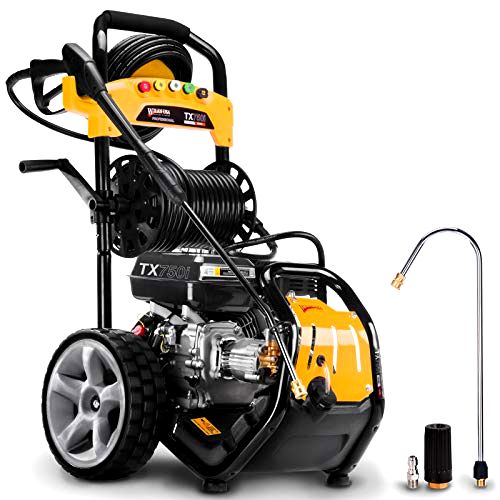
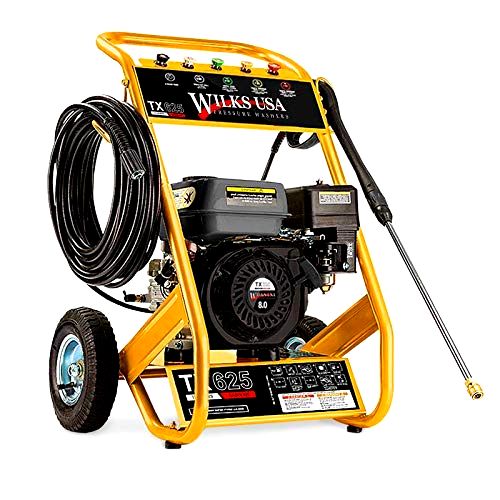
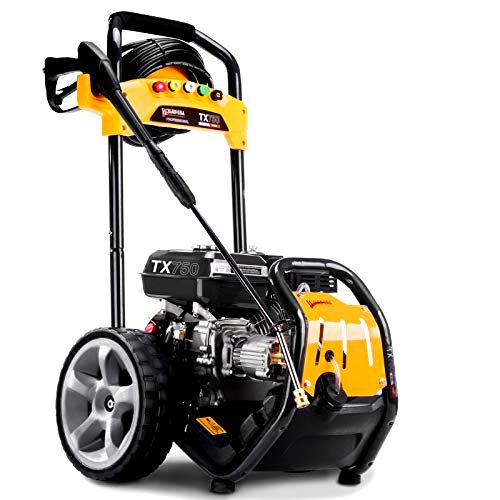
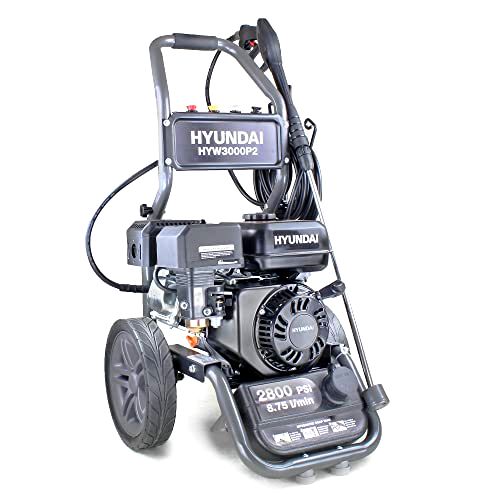
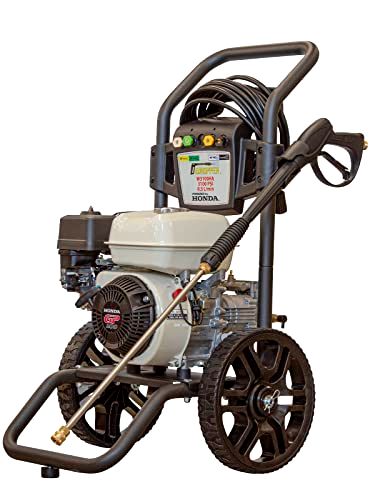
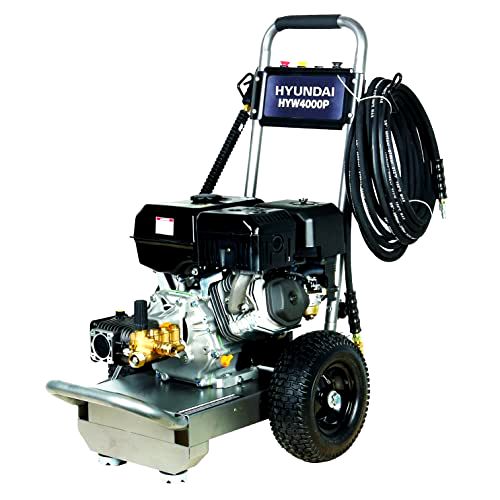
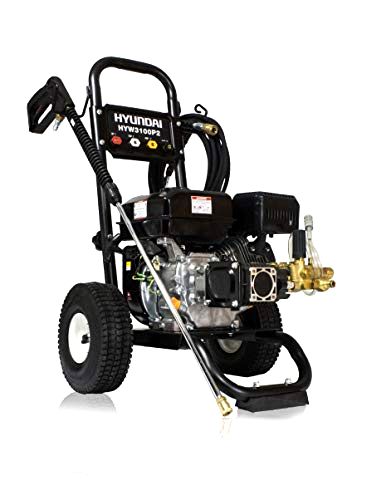
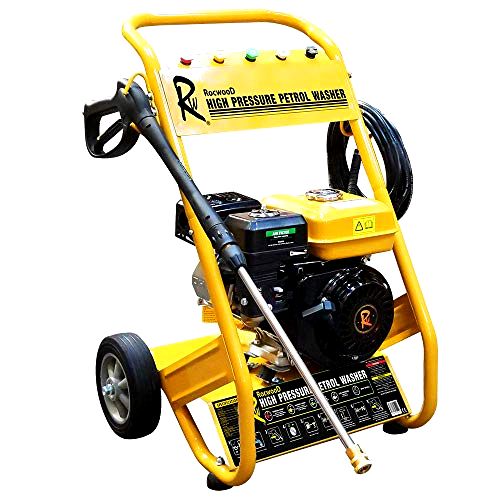
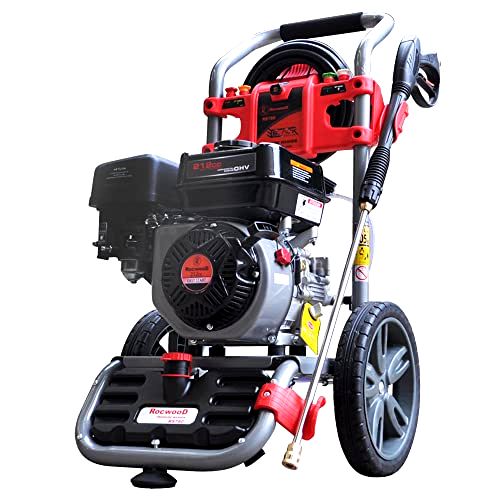
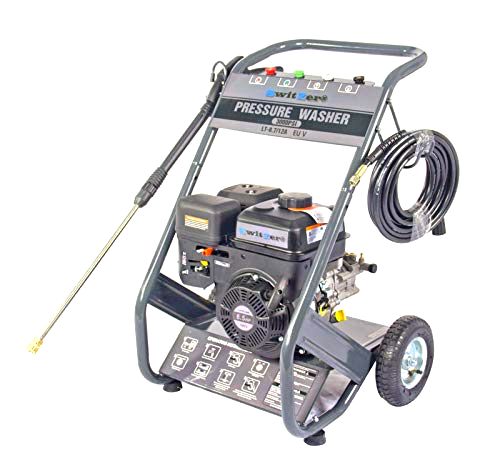

Share